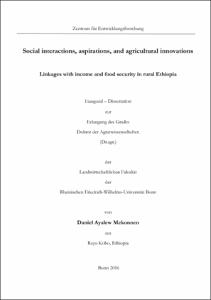Mekonnen, Daniel Ayalew: Social interactions, aspirations, and agricultural innovations : Linkages with income and food security in rural Ethiopia. - Bonn, 2016. - Dissertation, Rheinische Friedrich-Wilhelms-Universität Bonn.
Online-Ausgabe in bonndoc: https://nbn-resolving.org/urn:nbn:de:hbz:5n-45360
Online-Ausgabe in bonndoc: https://nbn-resolving.org/urn:nbn:de:hbz:5n-45360
@phdthesis{handle:20.500.11811/6636,
urn: https://nbn-resolving.org/urn:nbn:de:hbz:5n-45360,
author = {{Daniel Ayalew Mekonnen}},
title = {Social interactions, aspirations, and agricultural innovations : Linkages with income and food security in rural Ethiopia},
school = {Rheinische Friedrich-Wilhelms-Universität Bonn},
year = 2016,
month = nov,
note = {The persistence of poverty in some parts of the society across the globe inspired recent studies in development economics to embrace the use of multidisciplinary tools and concepts to better understand the situation of the poor. This thesis employs one of the recent conceptual tools, the aspirations-failure framework, which links the situation of the poor and their (under)investment behavior to aspirations failure. Based on individual and household level data collected from a sample of farm households in rural Ethiopia, the thesis first econometrically examines the effect of social interactions on aspirations (with respect to income, wealth, social status and education). The findings are in line with the theory which suggests that aspirations are socially determined through observations and social interactions. In particular, results indicate that social network size is an important determinant of aspirations and especially that of women’s, attesting to the importance of widening the ‘aspirations window’ – a person’s cognitive world that shapes their aspirations.
One of the channels in which aspirations may affect behavior is through their effect on risk aversion. The thesis finds that the ‘aspirations-gap’ (AG) – the difference between the aspired and present status – indeed relaxes risk aversion, and the association is non-linear. Results also indicate that the effect of AG on risk preferences is stronger for women.
Social interactions may also enhance diffusion of innovations and productivity. Based on social networks data collected using ‘random matching within sample’ procedure, the thesis identifies strong evidence of network externalities in the adoption of row-planting and also in farm productivity. The novelty of the thesis is also the identification of aspirations (or AG) as one of the key determinants of farmer innovativeness or the adoption of innovation products such as chemical fertilizers.
The main goal of the thesis is ultimately to try to understand the implications of aspirations by examining their interactions not only with the underlying drivers of well-being (such as the adoption of agricultural innovations and risk behavior) but also their interactions with the well-being outcomes themselves. The thesis uses various outcome indicators including income and consumption expenditure, various triangulating measures of food security, and subjective well-being defined in terms of life satisfaction and happiness. In nearly all outcome indicators, the thesis finds suggestive evidence that aspirations are important predictors of household well-being in rural Ethiopia.
The overall findings of the thesis clearly demonstrate that beyond the resource-related deprivations, low aspirations also play a role in rural households’ decision-making in Ethiopia, with consequences on well-being outcomes. Targeting the determinants of aspirations may therefore be a useful policy strategy.},
url = {https://hdl.handle.net/20.500.11811/6636}
}
urn: https://nbn-resolving.org/urn:nbn:de:hbz:5n-45360,
author = {{Daniel Ayalew Mekonnen}},
title = {Social interactions, aspirations, and agricultural innovations : Linkages with income and food security in rural Ethiopia},
school = {Rheinische Friedrich-Wilhelms-Universität Bonn},
year = 2016,
month = nov,
note = {The persistence of poverty in some parts of the society across the globe inspired recent studies in development economics to embrace the use of multidisciplinary tools and concepts to better understand the situation of the poor. This thesis employs one of the recent conceptual tools, the aspirations-failure framework, which links the situation of the poor and their (under)investment behavior to aspirations failure. Based on individual and household level data collected from a sample of farm households in rural Ethiopia, the thesis first econometrically examines the effect of social interactions on aspirations (with respect to income, wealth, social status and education). The findings are in line with the theory which suggests that aspirations are socially determined through observations and social interactions. In particular, results indicate that social network size is an important determinant of aspirations and especially that of women’s, attesting to the importance of widening the ‘aspirations window’ – a person’s cognitive world that shapes their aspirations.
One of the channels in which aspirations may affect behavior is through their effect on risk aversion. The thesis finds that the ‘aspirations-gap’ (AG) – the difference between the aspired and present status – indeed relaxes risk aversion, and the association is non-linear. Results also indicate that the effect of AG on risk preferences is stronger for women.
Social interactions may also enhance diffusion of innovations and productivity. Based on social networks data collected using ‘random matching within sample’ procedure, the thesis identifies strong evidence of network externalities in the adoption of row-planting and also in farm productivity. The novelty of the thesis is also the identification of aspirations (or AG) as one of the key determinants of farmer innovativeness or the adoption of innovation products such as chemical fertilizers.
The main goal of the thesis is ultimately to try to understand the implications of aspirations by examining their interactions not only with the underlying drivers of well-being (such as the adoption of agricultural innovations and risk behavior) but also their interactions with the well-being outcomes themselves. The thesis uses various outcome indicators including income and consumption expenditure, various triangulating measures of food security, and subjective well-being defined in terms of life satisfaction and happiness. In nearly all outcome indicators, the thesis finds suggestive evidence that aspirations are important predictors of household well-being in rural Ethiopia.
The overall findings of the thesis clearly demonstrate that beyond the resource-related deprivations, low aspirations also play a role in rural households’ decision-making in Ethiopia, with consequences on well-being outcomes. Targeting the determinants of aspirations may therefore be a useful policy strategy.},
url = {https://hdl.handle.net/20.500.11811/6636}
}






